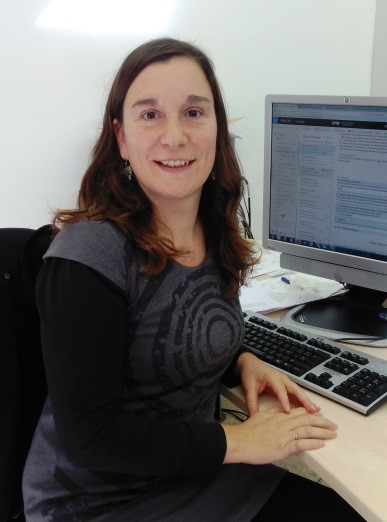
Researcher ID H-5251-2015; ORCID 0000-0001-6938-1233
Date of birth: 25-01-1979
Dr. Alba Hernández is Aggregate professor at Universitat Autònoma de Barcelona (UAB) and develops her research within the Mutagenesis Group. Her current main interests focus on the study of the carcinogenic potential of nanomaterials (NMs). Thousands of products with NMs have been installed in the industry and in products of daily consumption in the last years despite the uncertainty about the effects on exposed workers and consumers. It is necessary to face this new scenario of exposure generating data valuable for risk assessment and regulatory purposes. To do that, a shift in the conventional experimental toxicology designs and the available methodology are necessary. Then, the medium and long term objectives of Dr. Hernández are to generate the fundamental knowledge base on the human carcinogenic risks related to NMs exposure and the in vitro methodology for assessing these. Only in this way large-scale commercialization of nanotechnology will be done without compromising human health.
Dr. Hernández is also interested in the study of the mechanisms of carcinogenesis of the environmental contaminant arsenic.
General indicators of the scientific activity
- Total number of published articles: 35 (23 between 2014 and present, 7 in the process of revision)
- Total number of publications from communications: 6
- Total number of publications as first/corresponding author: 23
- Total number of publications in Quartile 1: 28
- Total number of publications in Decile 1: 15
- Total cites: 462
Latest selected publications
- Vila L., Marcos R., Hernández A. Long-term effects of silver nanoparticles in Caco-2 cells. Nanotoxicology 11: 771-80 (2017)
- Vila L., Rubio L., Annangi B., García-Rodríguez A., Marcos R., Hernández A. Frozen dispersions of nanomaterials are a useful operational procedure in nanotoxicology. Nanotoxicology 11:31-40 (2017)
- Rubio L., Bach J., Marcos R., Hernández A. Synergistic role of nanoceria on the ability of tobacco-smoke to induce carcinogenic hallmarks in lung epithelial cells. Nanomedicine, accepted (2017)
- Bach J, Peremartí J, Annangi B, Marcos R, Hernández A. Oxidative DNA damage enhances the carcinogenic potential of in vitro chronic arsenic exposures. Archives of Toxicology 90:1893-905 (2016).
- Annangi B., Bach J., Vales G., Rubio L., Marcos R., Hernández A. Long-term exposures to low doses of cobalt nanoparticles induce cell transformation enhanced by oxidative damage. Nanotoxicology 9:138–47 (2015)
- Annangi B, Rubio L, Alaraby M, Bach J, Marcos R, Hernández A. Acute and long-term in vitro effects of zinc oxide nanoparticles. Arcives of Toxicology 90:2201-13 (2015)
- Bach J, Sampayo-Reyes A, Marcos R, Hernández A (2014). Ogg1 genetic background determines the genotoxic potential of environmentally relevant arsenic exposure. Archives of Toxicology 88: 585 – 596 (2014).
- Pastoret A, Marcos R, Sampayo-Reyes A, Saucedo-Cardenas O, Lozano-Garza GH, Hernández A. 2013. Inhibition of hepatocyte nuclear factor 1 and 4 alpha (HNH1a and HNF4a) as a mechanism of arsenic carcinogenesis. Archives of Toxicology. 87: 1001 – 1012.
Research projects
- Enroled in 18 research projects as investigator (4 EU projects: NaNoREG, NANOGENOTOX, Risc-Rad and NewGeneris).
- IP of 2 national research projects.
On-going project as PI: Development of in vitro models for the study of NMs carcinogenic potential. Spanish Ministry of Science and Education (MEC). 120.000 €. 2016 – 2019.
Awards
- 2012, APOSTA Award for young UAB researchers with promissing future. Awarded with 25.000 euros for the project ‘Arsenic and Stem Cells-Is Cancer the destiny of this relationship?’
Other relevant merits
- Supervision of 1 Postdoc/ 6 PhD/ 5 national and 2 international Master Students
- More than 2000 hours of teaching in Biosciences degrees and more than 500 hours of teaching in Masters Programs.
- Reviewer of the following international peer-reviewed journals: Pharmacogenomics, Sciences of the Total Environment, Mutation Research – Genetic Toxicology and Environmental Mutagenesis, Mutation Research/Fundamental and Molecular Mechanisms of Mutagenesis, Journal of Hazardous Material, Toxicology Letters, International Journal of Cancer, Archives of Toxicology, International Journal of Hygiene and Environmental Health.
- Member of the European Environmental Mutagen Society (EEMS)
- Member of the Spanish Society of Environmental Mutagenesis (SEMA)
- Member of the Consortium of Biomedical Research in Network of Epidemiology and Public Health (CIBERESP; http://www.ciberesp.es/)
- 2015-2017, Coordinator of the Genetics Unit, Genetics Department, UAB, Spain
- 2010-2017, Member of 7 National Committees of Doctoral Thesis
- 2010, Member of the Scientific Committee of External Evaluation of Thesis, Science Nutrition Faculty, Universidad Autónoma de Nuevo León (UANL), Mexico